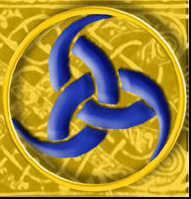
Terms of
Use
Submissions
~ Historical & Classical Poetry ~
Midgard’s giant snake,
Which in the ocean hurled,
His tale in jowl doth take,
And girdeth round the world.
Thor's Fishing
On the dark bottom of the great salt lake
Imprisoned lay the giant snake,
With naught his sullen sleep to break.
Huge whales disported amorous o'er his neck;
Little their sports the worm did reck,
Nor his dark, vengeful thoughts would check.
To move his iron fins he has no power,
Nor yet to harm the trembling shore,
With scaly rings he is covered o'er.
His head he seeks 'mid coral rocks to hide,
Nor e'er hath man his eye espied,
Nor could its deadly glare abide.
His eyelids half in drowsy stupor close,
But short and troubled his repose,
As his quick heavy breathing shows.
Muscles and crabs, and all the shelly race,
In spacious banks still crowd for place,
A grisly beard, around his face.
When Midgard's worm his fetters strives to break,
Riseth the sea, the mountains quake;
The fiends in Naastrand merry make.
Rejoicing flames from Hecla's caldron flash,
Huge molten stones with deafening crash
Fly out,--its scathed sides fire-streams wash.
The affrighted sons of Ask do feel the shock,
As the worm doth lie and rock,
And sullen waiteth Ragnarok.
To his foul craving maw naught e'er came ill;
It never he doth cease to fill;
Nath' more his hungry pain can still.
Upward by chance he turns his sleepy eye,
And, over him suspended nigh,
The gory head he doth espy.
The serpent taken with his own deceit,
Suspecting naught the daring cheat,
Ravenous gulps down the bait.
His leathern jaws the barbed steel compress,
His ponderous head must leave the abyss;
Dire was Jormungander's hiss.
In giant coils he writhes his length about,
Poisonous streams he speweth out,
But his struggles help him naught.
The mighty Thor knoweth no peer in fight,
The loathsome worm, his strength despite,
Now o'ermatched must yield the fight.
His grisly head Thor heaveth o'er the tide,
No mortal eye the sight may bide,
The scared waves haste i' th' sands to hide.
As when accursed Naastrand yawns and burns,
His impious throat 'gainst heaven he turns
And with his tail the ocean spurns.
The parched sky droops, darkness enwraps the sun;
Now the matchless strength is shown
Of the god whom warriors own.
Around his loins he draws his girdle tight,
His eye with triumph flashes bright,
The frail boat splits aneath his weight;
The frail boat splits,--but on the ocean's ground
Thor again hath footing found;
Within his arms the worm is bound.
Hymer, who in the strife no part had took,
But like a trembling aspen shook,
Rouseth him to avert the stroke.
In the last night, the vala hath decreed
Thor, in Odin's utmost need,
To the worm shall bow the head.
Thus, in sunk voice, the craven giant spoke,
Whilst from his belt a knife he took,
Forged by dwarfs aneath the rock.
Upon the magic belt straight 'gan to file;
Thor in bitter scorn to smile;
Mjolner swang in air the while.
In the worm's front full two-score leagues it
fell;
From Gimle to the realms of hell
Echoed Jormungander's yell.
The ocean yawned; Thor's lightnings rent the sky;
Through the storm, the great sun's eye
Looked out on the fight from high.
Bif-rost i' th' east shone forth in brightest
green
On its top, in snow-white sheen,
Heimdal at his post was seen.
On the charmed belt the dagger hath no power;
The star of Jotun-heim 'gan to lour;
But now, in Asgard's evil hour,
When all his efforts foiled tall Hymer saw,
Wading to the serpent's maw,
On the kedge he 'gan to saw.
The sun dismayed, hastened in clouds to hide,
Heimdal turned his head aside;
Thor was humbled in his pride.
The knife prevails, far down beneath the main,
The serpent, spent with toil and pain,
To the bottom sank again.
The giant fled, his head 'mid rocks to save,
Fearfully the god did rave,
With his lightnings tore the wave.
To madness stung, to think his conquest vain,
His ire no longer could contain,
Dared the worm to rise again.
His radiant form to its full height he drew,
And Mjolner through the billows blue
Swifter than the fire-bolt flew.
Hoped, yet, the worm had fallen beneath the
stroke,
But the wily child of Loke
Waits her turn of Ragnarok.
His hammer lost, back wends the
giant-bane,
Wasted his strength, his prowess vain;
And Miölner must with Ran remain.
From Adam Gottlob Oehlenschläger
(1779-1850)
Short Biography of Adam Oehlenschläger
Translation by Grenville Pigott, in "A Manual of Scandinavian Mythology,
Containing a
Popular Account of the Two Eddas and of the Religion of Odin" (London, 1839)